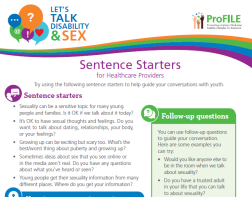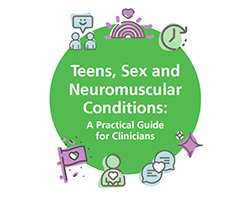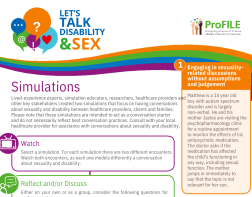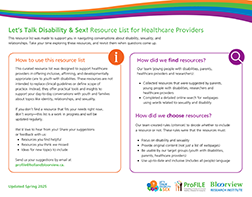Welcome to our healthcare provider resource page!
Here you will find simulations, videos, guides and other resources to help inform conversations about sexuality with clients and families. These resources were created with young adults with disabilities, parents of children with disabilities, educators, researchers and healthcare providers.
Simulations
What is a simulation?
A simulation involves creating an event or scenario typically encountered in healthcare, for the purposes of learning.
About the simulations
These simulations were created to help you start the conversation about sexuality. They do not necessarily show the best ways to have a conversation, but aim to prompt reflection and discussion.
Watch and Reflect | Select a simulation to watch. You will find two different encounters for each simulation. Please watch both encounters. Each one shows a different way to have a conversation about sexuality and disability. Use the questions provided in this handout (PDF) to reflect on and/or discuss as you watch the simulations. |
Simulation: Engaging in non-judgmental conversations about sexuality with young people with disabilities | Scenario Grace is a 18 year old girl who has cerebral palsy and just recently had hip surgery. She is meeting with Julie, a social worker, to discuss discharge planning. As part of their conversation, sexuality is brought up hesitantly by Grace. She talks about her relationship with her boyfriend and is unsure about how her injury will affect her sexually. |
Simulation: Highlighting the importance of sexuality in young people with disabilities | Scenario Matthew is a 14 year old boy with autism spectrum disorder and is largely non-verbal. He and his mother Jackie are visiting the psychopharmacology clinic for a routine appointment to monitor the effects of his antipsychotic medication. The doctor asks if the medication has affected the child’s functioning in any way, including sexual function. The mother jumps in immediately to say that the topic is not relevant for her son. |
Plain text resources
Click on the drop down sections to access plain text versions of some of the PDF resources shown above.
Sentence Starters for Healthcare Providers
Try using the following sentence starters to help guide your conversations with youth.
Sentence Starters
Sexuality can be a sensitive topic for many young people and families. Is it OK if we talk about it today?
It’s OK to have sexual thoughts and feelings. Do you want to talk about dating, relationships, your body, or your feelings?
Growing up can be exciting but scary too. What’s the best/worst thing about puberty and growing up?
Sometimes ideas about sex that you see online or in the media aren’t real. Do you have any questions about what you’ve heard or seen?
Young people get their sexuality information from many different places. Where do you get your information?
Follow-up questions
You can use follow-up questions to guide your conversation. Here are some examples you can try
Would you like anyone else to be in the room when we talk about sexuality?
Do you have a trusted adult in your life that you can talk to about sexuality?
Is there anything else you’d like to talk about?
Families/communities may have different ideas about relationships and dating. What does your family think?
Dating is a choice. You don’t have to date you can say no. Do you think you would like to date?
Do you use social media to get sexuality information?
Keeping conversations private
When having these conversations, talking about privacy and confidentiality is important. Here is a statement you can try
I promise to keep our conversations private and confidential, unless you want me to talk to your parent/caregiver about a particular issue. I would only have to break confidentiality if I thought you or someone else were being abused or neglected. I would also need to tell someone if I thought you might hurt yourself or someone else.
Please adapt this statement according to your practice and the requirements of your regulatory body.
Simulations
Lived-experience experts, simulation educators, researchers, healthcare providers and other key stakeholders created two simulations that focus on having conversations about sexuality and disability between healthcare providers, clients and families. Please note that these simulations are intended to act as a conversation starter and do not necessarily reflect best conversation practices. Consult with your local healthcare provider for assistance with conversations about sexuality and disability.
Watch
Select a simulation. For each simulation there are two different encounters. Watch both encounters, as each one models differently a conversation about sexuality and disability.
Non-judgmental conversations about sexuality with young people with disabilities
Grace is an 18 year old girl who has cerebral palsy and just recently had hip surgery. She is meeting with Julie, a social worker, to discuss discharge planning. As part of their conversation, sexuality is brought up hesitantly by Grace. She talks about her relationship with her boyfriend and is unsure about how her injury will affect her sexually.
The importance of sexuality in young people with disabilities
Matthew is a 14 year old boy with autism spectrum disorder and is largely non-verbal. He and his mother Jackie are visiting the psychopharmacology clinic for a routine appointment to monitor the effects of his antipsychotic medication. The doctor asks if the medication has affected the child’s functioning in any way, including sexual function. The mother jumps in immediately to say that the topic is not relevant to her son.
Reflect and/or Discuss
How do you think each of the individuals felt in the situation? Why do you think they felt like this?
What did the healthcare provider do or say that was helpful? Why?
What could the healthcare provider have done or said that could have been more effective?
What family or client strengths did/could the healthcare provider capitalize on?
What are the main messages you will take away from this scenario?
Think
Reflecting on how these two encounters felt for you.
What differences did you notice?
What changes do you feel inspired to make when you’re working with clients and families?



